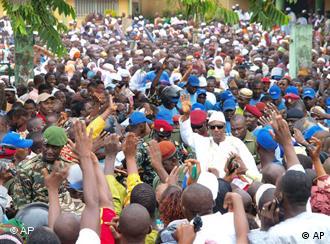Is Guinea really turning the page for press freedom?

Can Alpha Condé live up to the high expectations?
Sekou Touré, Lansana Conté, Dadis Camara – Guinea has seen only three presidents in more than 50 years of independence. None of them has governed the country in a democratic way. Moreover, freedom of the press is still far from reality for the country’s journalists.
In 2010, Guinea finally went through democratic elections. So, what’s the state of press freedom in the country’s new democratic era?
Reporters without Borders looked at the current media situation in Guinea as well as in Niger – another country undergoing a transition. Turning the page is the optimistic title of their report, but the media watch dog organization has also labelled press restrictions issued by authorities on July 26 as censorship. Following an attempted attack on Guinea’s President Alpha Condé, the National Communication Council, banned all media from mentioning the attack. 72 hours later it lifted the ban.
We asked Ambroise Pierre, Head of the Africa-desk at Reporters without Borders, whether the lifting of the ban was a victory for press freedom?
Yes, it’s a victory! The National Communication Council’s (CNC) decision to ban all media from mentioning the attack on President Alpha Condé was a real threat for press freedom. By keeping all media all over the country from reporting on a very important news event, the CNC established a kind of pre-censorship. Thus, the decision to lift this ban is a real victory.
But there are still many unresolved issues concerning the press freedom of Guinea, there are still many worries left concerning journalists’ freedom to do their work. We, at Reporters without Borders are very happy about the lifting of the ban on mentioning the attack on Alpha Condé, but we expect much more from a government that calls itself “democratic”. This government needs to prove that it is democratic by letting the journalists do their work freely.
The Guinean government had justified its decision to ban reports on the attempted murder of the President by saying they wanted to calm down tensions. For the sake of peace, would there be any justification sometimes to ban the media from reporting on certain events?
Yes, it happens that the media deteriorate – we’ve seen examples of this all over the world. In such cases it’s of course the duty of the media regulatory organs to call the media to order and to guard the social peace. But the context in Guinea is very precise: We are under the impression that the Guinean government has been using this reasoning of national unity, social peace, and fragile social patterns. They use it in order to avoid the freedom of expression.
Guinea has a history of more than 50 years of dictatorship and military governments. Are the journalists in Guinea ready to assume their responsibilities as the forth estate in their country?
First of all, they need to have the possibility to do it! We’ll see how the local press is going to cover current affairs in 2011. Guinea has just gone through a transition that is supposed to be a democratic one. It has seen presidential elections where the historical opponent came into power, a President who says that he wants to democratize Guinea. But I don’t know any democracy that starts by gagging the press. The government has to let journalists do their job. There are good journalists in Guinea as well as some that are less good – like everywhere. So we’re calling out to the Guinean authorities who call themselves democratic and who say that they want to change the country, that a democratic change is only possible with press freedom. The journalists need to be able to do their job peacefully.
How can the journalists be better prepared to do their work after the transition in Guinea?
Well, if we look at the phase of transition during 2010, we see that the Guinean media have done an excellent job in covering the transition process. This proves that some media are cutting edge. The media’s efforts can be accompanied by good trainings if they have all the liberty to cover political current affairs. Most of all the media need to be free. They need the freedom of expression, the freedom to express their opinion on current affairs. That is how the journalists will train themselves on the job in covering all events.
Interview: Bob Barry
Translation: Christine Harjes




Feedback